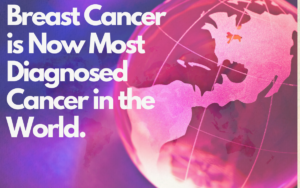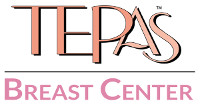
Breast Cancer is now the most diagnosed cancer in the world.
Last year there were over 19 million cases of cancer diagnosed around the world. Female breast cancer accounted for 11.7% of them, passing lung cancer at 11.4% for the first time. Cases of breast cancer were increasing even in countries with normally low rates.
Some of the reasons for this include people doing less exercise and consuming more alcohol, leading to an increase in body weight. That extra weight increases estrogen production, which contributes to the risk of breast cancer. Other reasons include pregnancies later in life and less breastfeeding. Having a child after the age of 35 used to be called “geriatric pregnancy”, but thankfully that has been renamed to “advanced maternal age.” Both obesity and late pregnancies can cause health issues anyway, so there is double the reason to avoid them.
Unfortunately, these numbers do not include data from during the coronavirus pandemic, which has put a strain on medical services and everyday life. Hospitals are preoccupied with diagnosing and treating COVID-19 patients and are overcapacity while healthcare workers are overworked. The general public is going out less and is more stressed, leading to fewer of them getting breast cancer screenings. Some have lost their jobs and cannot afford screenings. Some hospitals may be delaying screenings, and others might be shutting down. What this all means is that if we look at the data from during the pandemic, cases of breast cancer diagnoses will probably drop. That does not mean that fewer people are getting breast cancer, it means that fewer of those people will find out they have it. Missing an annual screening means that a diagnosis can be delayed for a full year, increasing the risk of health dangers from later-stage cancer.
If you have not had your annual mammogram but can afford to, it is highly recommended you do. Fears of going outside are completely normal but following safety guidelines and being careful should keep you safe and are worth the risk to avoid a potentially life-changing late breast cancer diagnosis. If the fear of the pain is keeping you from getting a mammogram, you can look for a facility with a SmartCurveTM 3D mammogram machine. SmartCurveTM adapts to the shape of the breast, so almost no pressure is applied for a screening without pain.
All women above the age of 40 are recommended to have annual screenings to catch cancer as early as possible. Early detection allows you to avoid risks, and prevention is always preferable to curing!

